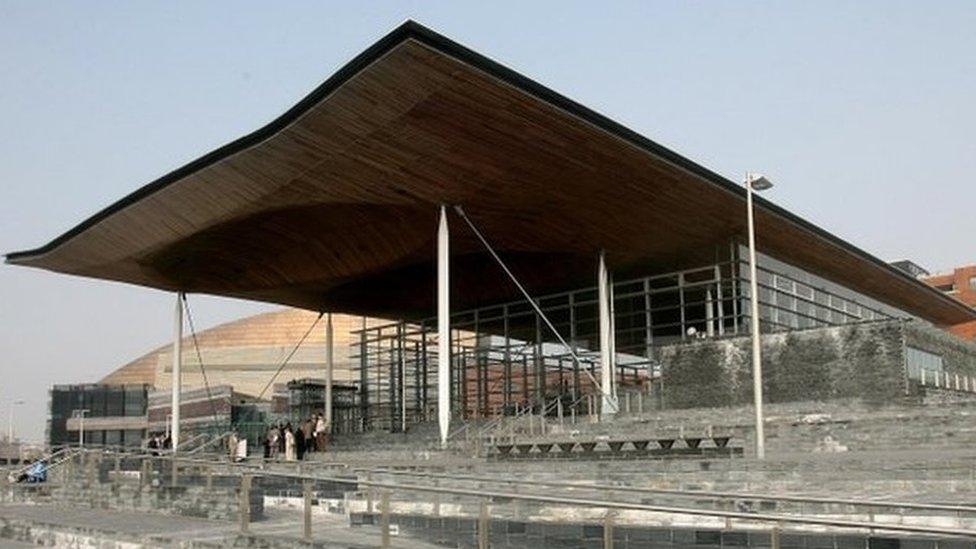Plaid Cymru's Steffan Lewis: Assembly member is my dream job
- Published
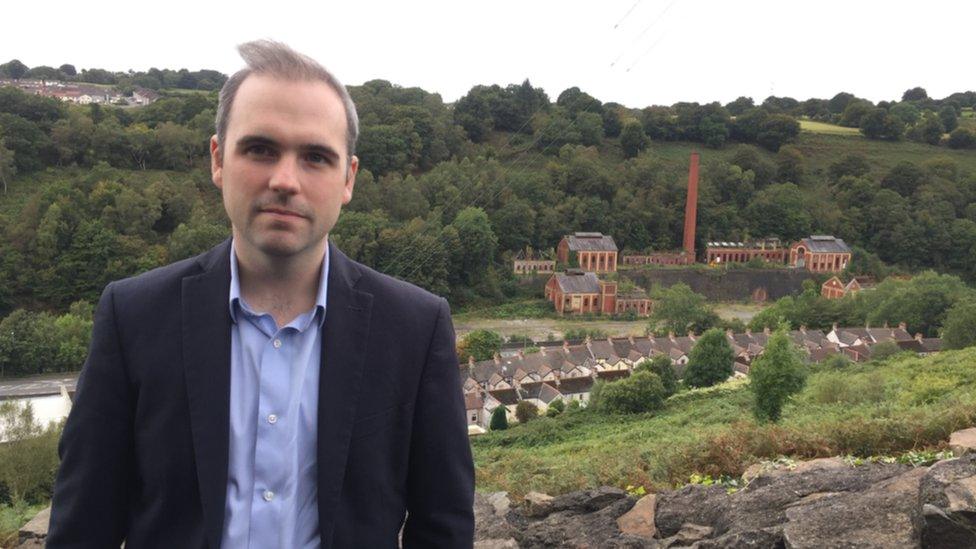
Steffan Lewis grew up in south Wales as the mining industry declined
Celtic v Hibernian, Celtic Park, 3pm kick-off, Saturday 30 September.
"It should be a good one," Steffan Lewis tells me, as he explains that it's pencilled in the diary, subject to Mrs Lewis's approval.
His love for "The Bhoys" developed when he lived in Scotland for a time with his wife, Shona, a native of Inverness in the Highlands.
"They were always my team in Scotland," he says.
"I went to see them many years ago for the first time and I just fell in love with the club."
Football, family, and politics - these are Steffan's three big passions.
Meeting at a vantage point overlooking the Navigation Colliery in Crumlin, near Pontypool, he reveals how politics was foremost in his mind during his formative years.
"When I was growing up it was a very distinct building architecturally," he says.
"Travelling along this road on a school bus when I was growing up, that sort of whetted my intrigue in local industrial history in particular and got me a bit curious, I suppose, about Welsh industry, and industry in my own communities."
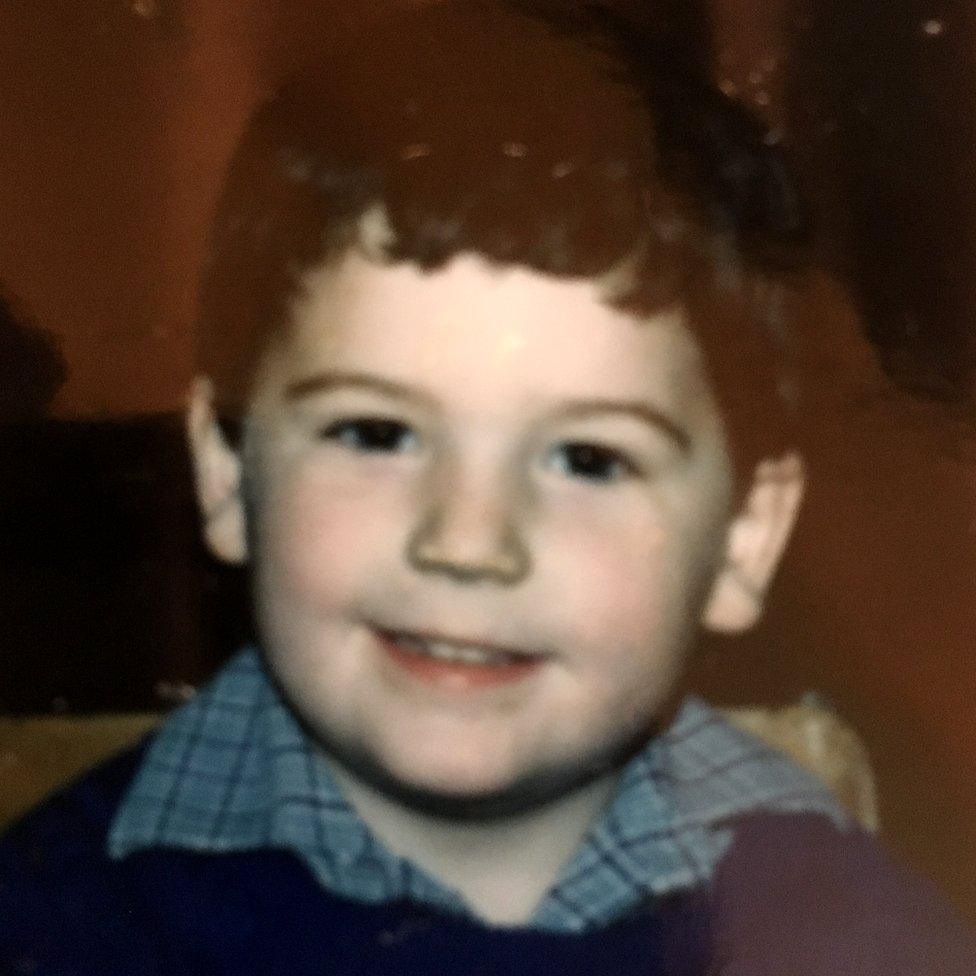
Steffan aged about six
A stone's throw from our lookout point is Steffan's first primary school in Sofrydd. He would later move to Ysgol Gymraeg Cwm Gwyddon before starting secondary school in Ysgol Gwynllyw, Pontypool.
"It was during that period when the mines were closing down," he says.
"I remember the coal trucks, I remember the coal man coming and delivering the coal to our house, and then, all of a sudden, as it seemed to a very young boy, it just vanished.
"So I was intrigued by what had happened to our communities. That then got me to become politically aware.
Would he describe his family as working class?
"Yeah, absolutely! One of the things I try to do in my spare time is my family tree. I've gone back to the late 18th Century with my father's ancestors.
"We started off as shoemakers in Castleton and then, for about four or five generations, coal-mining. I'm just the second generation of Lewises not to go underground."
His father, a former retail worker who died a few years ago, and mother, a social worker, were both members of Plaid Cymru although Steffan says they were politically "engaged" rather than active.
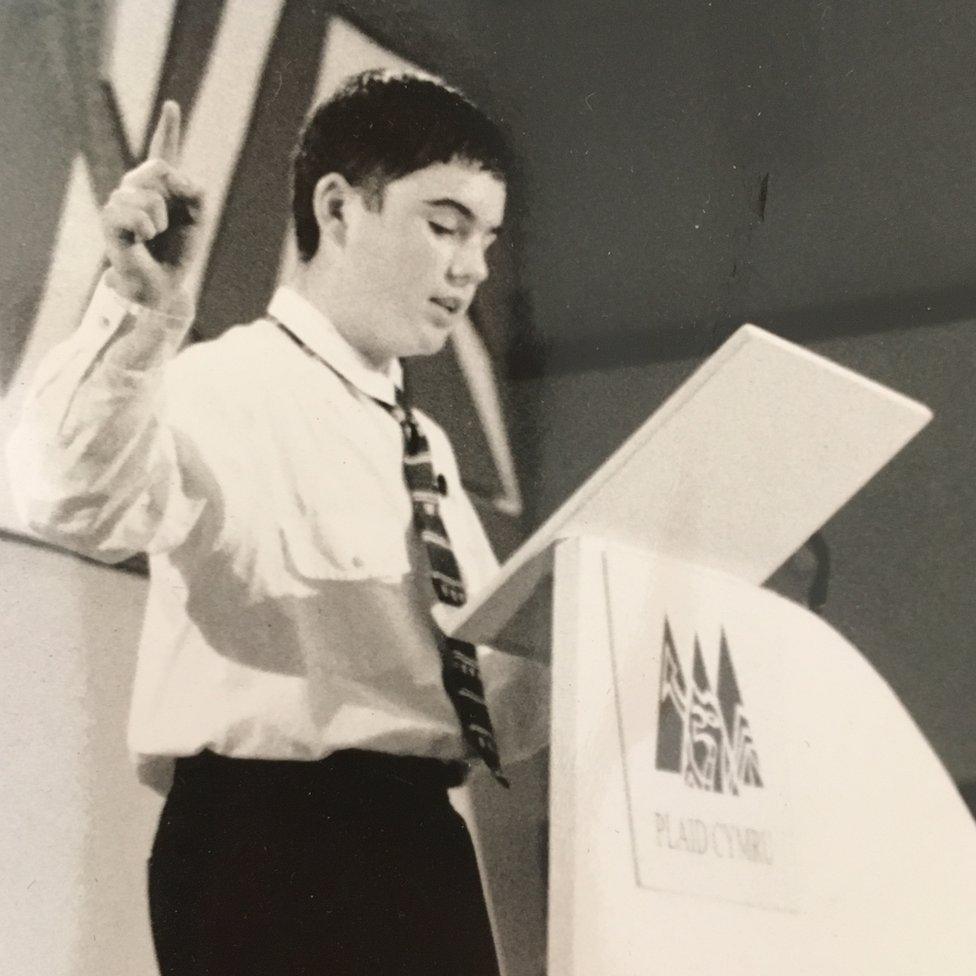
Steffan addresses the 1997 Plaid Cymru conference in Aberystwyth as a schoolboy
In stark contrast, Steffan would become politically active at the age of 11.
The Islwyn by-election of 1995, triggered when former Labour leader Neil Kinnock stood down from the House of Commons, was "when I really started to get excited by politics and excited by political campaigning".
It was around this time that he went to his first Plaid Cymru branch meeting and he vividly remembers the night of the Welsh Assembly referendum result, 20 years ago this month.
"I had a paper round at the time. I remember staying up for a while watching the results come in on the television and looking at [then Plaid leader] Dafydd Wigley's face in some BBC studio and seeing him looking really down and I just thought, that's it, it's lost.
"I got up the following morning and picked up my paper-round bag, chucking newspapers pretty upset through people's doors, thinking 'how could you?' and then going back home and my mother telling me we'd won!"
The assembly election campaign that followed in 1999 would see Steffan become "really active", which had a detrimental effect on his studies.
"My GCSEs weren't as good as they should've been. I remember dreading results day but I made up for it at A Level. So all was forgiven!"
After school, Steffan travelled around the USA, worked at a call centre, and started studying Religious Studies and Ethics at Cardiff University before dropping out - "I was finding my feet," he says.
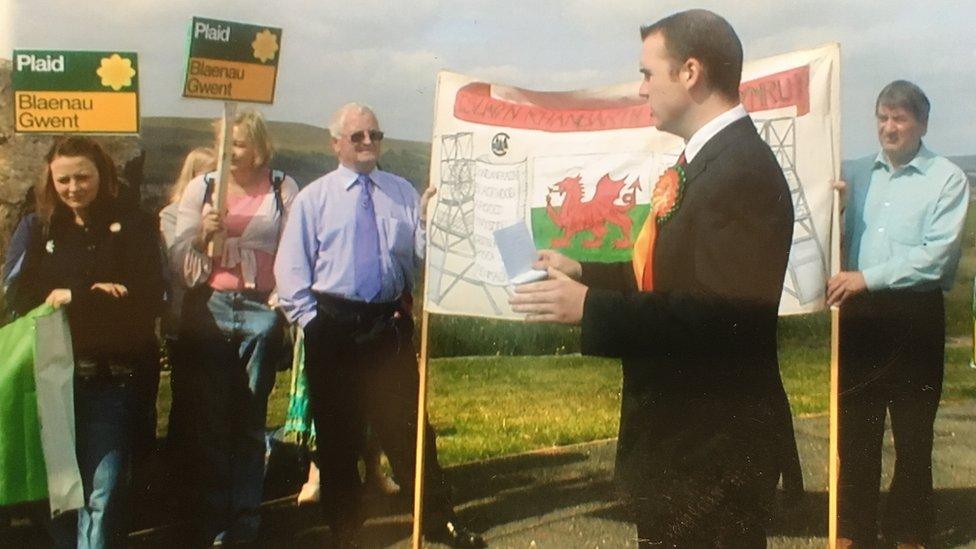
On the campaign trail in Blaenau Gwent in 2006
Standing as a candidate for the first time in the Blaenau Gwent Westminster by-election in 2006 - he came third - made him decide that he "wanted to get back into politics full-time" and so he started working as a Plaid Cymru policy officer a few months after the vote.
After several attempts at Westminster and assembly elections, his big political breakthrough came in 2016 when he was elected to the assembly as a regional member for South Wales East in Cardiff Bay, replacing his mentor, Jocelyn Davies, who he worked for as a communications officer for many years.
"There's no doubt in my mind that without Jocelyn's support and tutelage, I wouldn't be an assembly member today," Steffan says.
"I'm very, very fortunate that I've got the dream job," he adds, but is quick to point out that fatherhood is "the most rewarding thing in the world."
How is he at changing two-year-old son Celyn's nappies?
"I tell you what - I've pretty much mastered it now. The only problem is now that he's at the age where he is so mobile himself, just when I thought I'd got the knack of it, try putting it on when he's upside down and backwards!"
With Celyn due to receive a Welsh-medium education, he says his Scottish wife "is picking up a lot more" of the language - "haul", meaning sun, is the latest word in her vocabulary.
Married since 2009 and now living in Blackwood, they first met in a pub in Cardiff when she was visiting family.
Other than finding that "it can be difficult" to strike a work-life balance, what has Steffan made of his first year in the assembly?
"I've found aspects of it more interesting and far more rewarding than I thought I would, such as the casework, actually," he says.
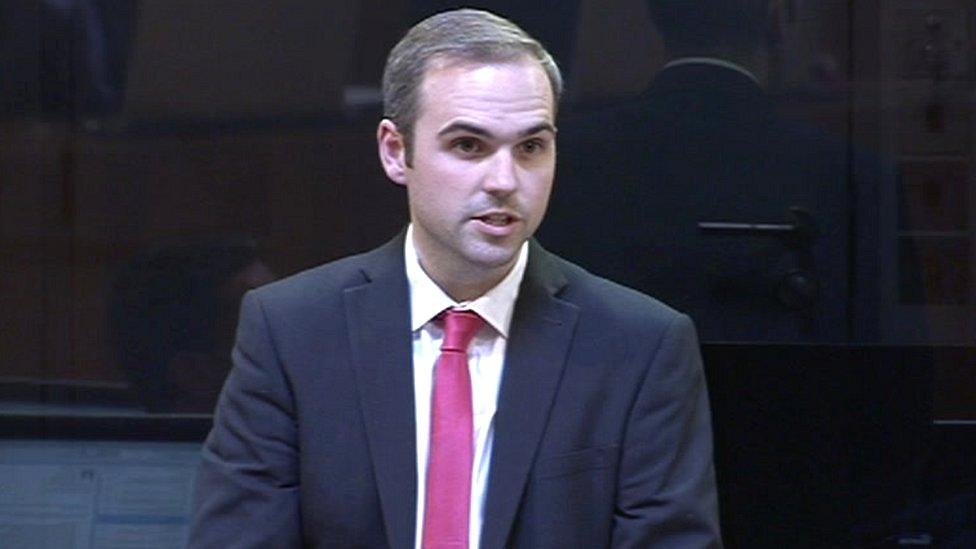
And, as Plaid Cymru's Brexit Spokesperson, he's found the Welsh response to be "entirely frustrating because, yet again, it's timid, is limited in its ambition, and I feel that we are once again as a nation our own worst enemies".
He believes the Welsh Government should appoint a Brexit minister and start developing international policy that "can be the catalyst for Wales to get recognition globally, to build links and relations and to boost our profile".
"Let's be frank, if you have to choose between Gareth Bale and Welsh Government who's done more for Wales' international profile, there's no doubt in my mind it's Gareth Bale."
A week before the EU referendum result, Steffan, a Remainer, said he "had a bad feeling" and correctly predicted Wales and England would vote to leave.
"I think we've got to understand and respect communities, like this one where I grew up, for their reasons for voting for not just leaving the European Union but actually their reasons for being fed up with the political status quo and the political establishment," he says.
"There's an opportunity for Plaid Cymru to tap into that despair and actually to channel it into something very positive, to demonstrate to people who've lost faith in politics in recent years that actually there's an alternative, that we're all about communities taking back control actually but that we've got a different way of how we can see that being fulfilled."
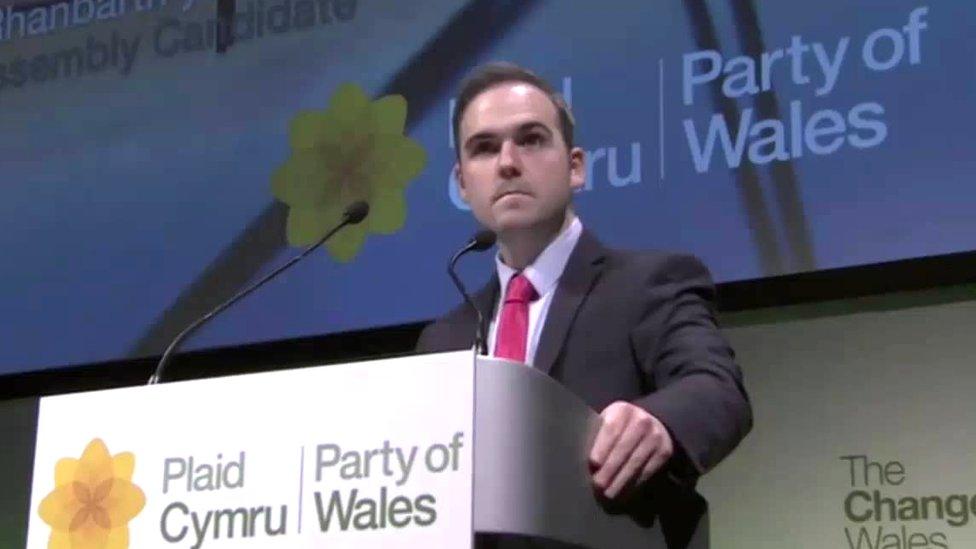
Steffan addresses the 2015 Plaid Cymru conference as a prospective assembly candidate
Highly critical of the Welsh government, Steffan is nevertheless indifferent about Plaid's current relationship with Labour - the so-called compact.
"I think the compact made sense, particularly at the time when it was agreed," he says.
"But now we've gone through that initial stage of having a first minister elected and a government established, whether we want to take it to a case-by-case basis or call it a compact, I don't see the difference either way.
"I think the party has always got to exert to the max its influence at every opportunity to do what is right by the people of Wales and that will mean, from time to time, working with the party in government.
"The competition, I think, between parties, isn't just about who can win in a slanging match. I think the competition, ultimately, has got to be a competition of ideas and vision and having two different trajectories."
But since the inaugural assembly election in 1999, Plaid Cymru has faltered, having never bettered their initial tally of 17 seats.
"I think the trend since devolution, really, of us more or less flat-lining is pretty much down to the fact that we are very much still within a UK context here in Wales, more so than in Scotland and Northern Ireland," Steffan says.
"We're still working on carving out a distinct Welsh political arena. But I've no doubt though, '99 proved it and other elections as well, that where we have a ground effort, and when that is coupled with a successful national programme, we can make gains."
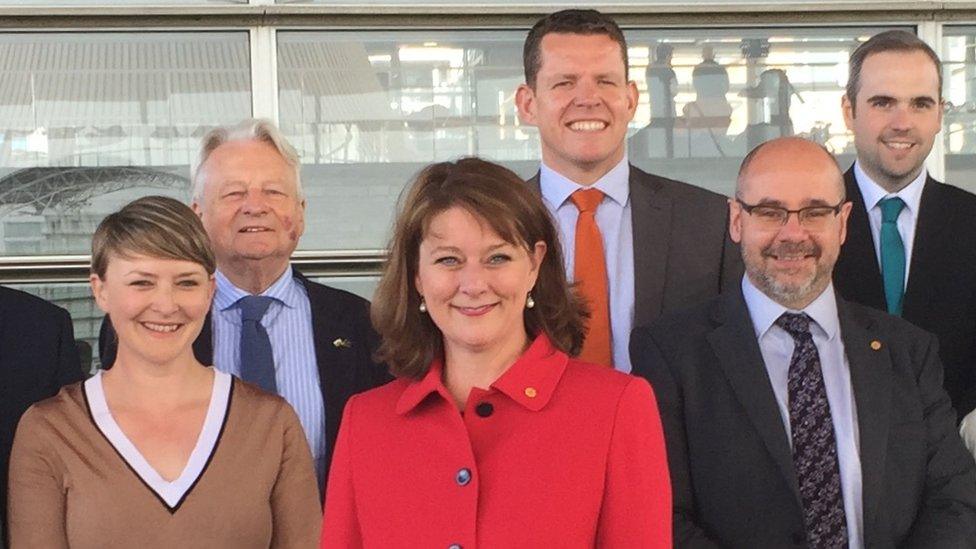
Steffan (top right) joins fellow Plaid Cymru AMs at the Senedd following the 2016 assembly election
Some in the party have (anonymously) questioned aloud over the summer whether Plaid Cymru with Leanne Wood at the helm can make those gains.
As you would expect from Leanne Wood's former special adviser, Steffan continues to back her leadership.
"It's about getting the formula right in politics; it's not just about one person or one aspect of a campaign," he says.
"It's getting the formula right that puts Plaid Cymru in a match-fit position to win the next election and to win over the people of Wales with our programme and our team.
"I absolutely believe we can do that with Leanne Wood as leader."
Plaid will need to make significant gains if is to shrug off its self-styled moniker as a "government in waiting" and actually take power.
In Steffan's opinion, it is only through governing that the party can put the issue of Welsh independence firmly on the agenda.
"Wales is only going to succeed when the people of this country believe in themselves," he says.
"If we can get Wales to a point where most people think that all options are there for them, that we've reached a level of prosperity and success and self-confidence, where the people of Wales believe Wales could be independent, well then it's a matter then for them to decide whether it should or not."
Does he foresee an independence referendum in his lifetime?
He certainly hopes so given that he is the youngest member of the assembly.
"I'm the baby of the house - even though I don't look like it!"
- Published8 August 2016
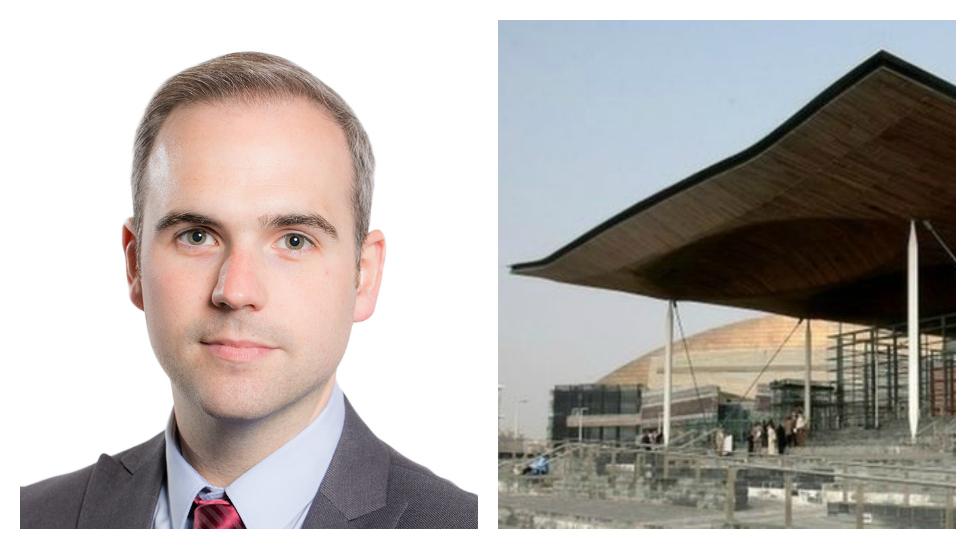
- Published17 July 2017
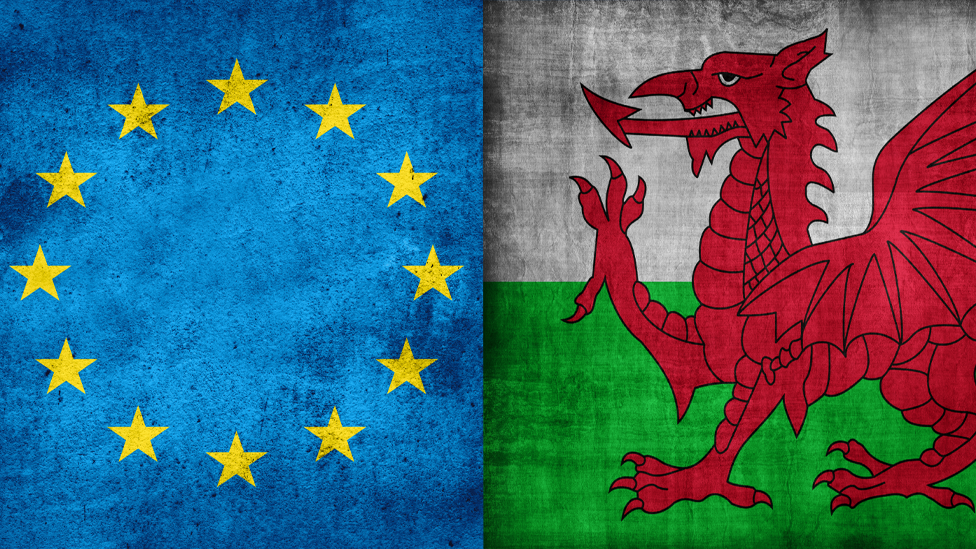
- Published16 November 2016
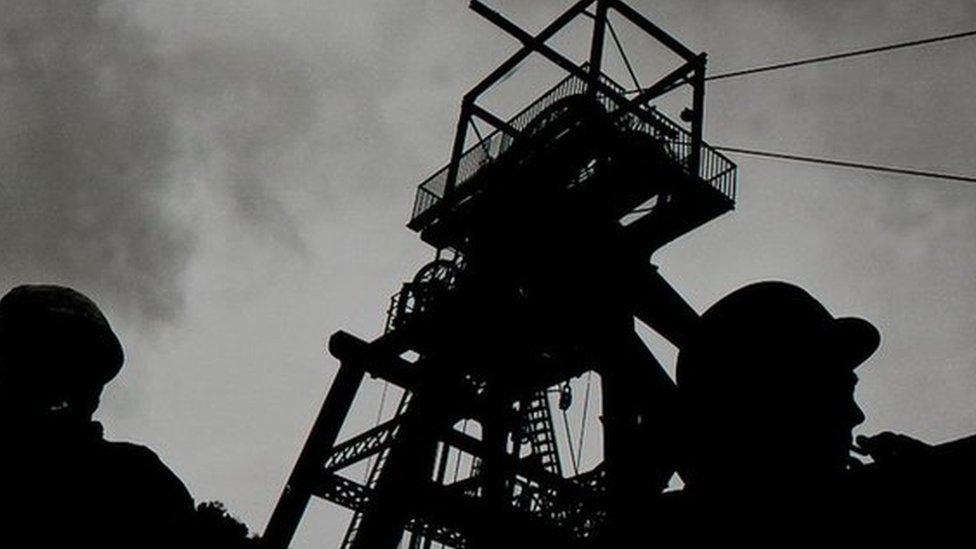
- Published18 May 2016
